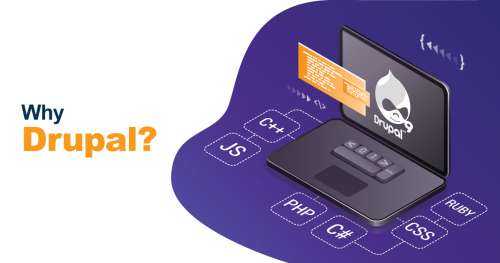
Why Choose Drupal Over Any Other CMS?
The dilemma of choosing the more suitable CMS from a range of possible CMS options can be overwhelming.' is a major question that comes to mind when thinking forward towards development.
Now, that alone relies on the requirements that you will come up with. For a blog-related website, WordPress might be one's choice. Similarly, for a website catering to e-commerce, Magento might be one's preference. The question arises why should Drupal be chosen over existing options. Why is Drupal the best CMS? Safety, 3rd party implementations, support networks, comprehensive, SEO friendly, open-source tools, support for Free Module / Plugin, etc. are the contributing factors. If you have a query as to “Should I use Drupal?” These are some of the features that should help you make an informed decision.
Drupal Migration Services are also available and it is the simplest approach via which you can relocate your existing website to Drupal. The complexity of the database structure does not matter.
Some advantages that come with choosing Drupal are:
1. Community
The open-source structure of Drupal promotes consistent collaboration and development through the Drupal community's support and enthusiasm. Today, in 230 countries, there are over 1.4 million Drupal users who are committed to pushing Drupal towards success. The opportunity to generate extraordinary digital experiences extends far beyond what a single team of patented software developers could conceive of, with a pool of such varied experts working constantly to make Drupal better.
2. User Experience
The new Drupal is a revolutionary digital platform that can be leveraged by developers and marketers to generate memorable customer experiences. The latest editions of Drupal have prioritized user experience (UX) to encourage everyone to strengthen existing customer experiences, from site editors to content creators. Some of Drupal's user interface improvements include:
Layout Builder - Provides an easy-to-use page building experience for content authors that allows editors to control the get-up of their content without relying on a developer.
The administrative theme of Claro provides a cleaner, easier-to-use site management, configuration, and authorship interface.
Mobile sensitive web features- out-of-the-box delivery of mobile-friendly themes, sensitive images, and mobile management.
3. Scalability
Drupal is an effective and future-ready CMS that gives companies the freedom to adapt to their needs. The versatile API architecture of Drupal facilitates the development of exponential content across a worldwide multi-site ecosystem. Drupal is optimized for many caching circuits that facilitate faster page loading, optimized bandwidth, and stronger web performance overall, even under high-pressure conditions.
4. Security
Safety is the primary concern when it comes to creating digital experiences that people trust. Not conforming to digital security norms can both harm consumer relationships and cause companies to suffer heavy legal fees for heavily regulated and public-facing sectors such as government and healthcare. Security is taken more seriously by Drupal than any other CMS. That's why organizations such as Georgia State, Steward Health Care, and Fannie Mae depend on Drupal to safeguard their websites and hold their audiences' trust.
5. Accessibility
An inclusive web environment for all users is prioritized by Drupal's determination to accessibility standards. For any specific component and function added to the core, availability is a gateway requirement.
Drupal guarantees that all of its features and functionality comply with the out-of-the-box WCAG, WAI-ARIA, and ADA standards of the World Wide Web Consortium. Some of the characteristics of usability included in Drupal 8 and the Drupal 9 entail:
Color Contrast Themes and text size optimization
Defaults of Alt Tag
Control Tab Order
Mobile Responsivity
Aural Alerts For sectors, such as tertiary education, with the responsibility of providing learners from a variety of backgrounds with opportunities and knowledge, accessibility is a major issue. At present, over 70% of educational institutions including renowned institutions such as North Dakota State University, have opted for Drupal as their CMS of choice. Drupal stays true to providing everyone, regardless of their circumstances, accessible information, and positive digital experiences.
Some of the widely asked questions when it comes to Drupal is, Why is Drupal better than WordPress? What are the benefits of Drupal over WordPress? Which is the best, Drupal or WordPress? So, let's take a deep plunge and compare them one by one according to scenarios.
Drupal vs WordPress
There is no denying about the intricacy of Drupal in contrast to WordPress, but no one can refuse that Drupal offers advanced features. The interface of Drupal is much wider than that of WordPress and it mainly uses types of content, views, categorizations, etc. So, if the requirement in that situation is for multiple templates, Drupal is rated higher than WordPress.
Flexibility
Drupal is more versatile than WordPress as it is engineered by developers for custom software development.
Everything is freely accessible as modules in terms of capability and you can customize everything in Drupal with the assistance of a developer. In WordPress, plugins are obtainable in paid versions. WordPress is intended to be a blogging platform. So, to manage a large amount of content and consumers, it has limited functionality and is Drupal's backbone for handling thousands of data and customers at the same time.
Security
Security is the primary concern for every customer who invests in building a website, and if their website is hacked, then everyone involved in the project will suffer a major loss. Drupal has enterprise-level security due to the large open-source community, which offers comprehensive security reports. The website of Whitehouse.gov or U.S. Govt is on Drupal, which demonstrates the trust in Drupal at the level of security.
In conclusion, you must first recognize the requirements of the customer and analyze them to choose which best fits your requirements. With the service component of Drupal 9 out now, developers have a complete object oriented structure for building websites, portals, e-commerce solutions, etc. Also, the answer to the question, “Is Drupal hard to use?” is NO. It is made for the ease of users and allowing yourself to be immersed in the experience is the surest way to make the best use of it.





